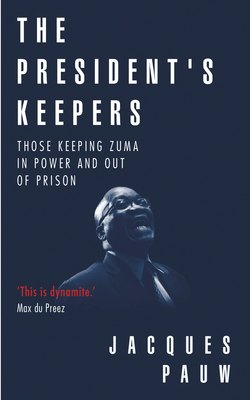Читать книгу The President's Keepers - Jacques Pauw - Страница 5
На сайте Литреса книга снята с продажи.
Introduction
ОглавлениеOn Sunday night, 27 August 2017, my laptop and cellphone were stolen from my office at our restaurant and guesthouse in Riebeek-Kasteel in the Western Cape. Despondency and dread engulfed me when I walked into the room and was confronted by a computer cable and nothing more. A small window bordering Van Riebeek Street stood open.
I was initially calm, and walked to the bar and poured myself a stiff brandy and Coke. Then I went back to the office and phoned one of my sources.
“What was on the laptop?”
“Everything.”
“How do you mean, everything?”
“Everything. The whole book. And notes, documents, reports, names, telephone numbers, everything.”
“Is it password-protected?”
“Not really.”
“Have you backed it up?”
“Some. Not everything.”
“Is my name somewhere there?”
“I don't think so but I'm not sure.”
Moments of silence before the source spoke: “You realise we're fucked.”
“Do you think it's them?”
“Without a doubt.”
“How can you be so sure?”
“This is exactly how they do it. It's a warning.”
Composure gave way to panic and horror. I was convinced that someone from crime intelligence, the Hawks or the State Security Agency had nicked my laptop and cellphone. My sources would be exposed. I would be arrested. State lawyers would try to stop the book.
But my wife, Sam Rogers, was not convinced. She pointed at the window and said: “Look at that little hole. Only a child can get through it. It's not the baddies; it's children.”
Riebeek-Kasteel and some of the farms surrounding the village are home to a throng of neglected, desperate children. They roam the streets, and some of the older children have been apprehended for petty crimes. Sam knows them by name; she feeds them every Friday.
The next morning, two of my staff members and waitresses from another restaurant took to the streets, telling locals about a reward for the return of my laptop and cellphone.
Twenty-four hours later, I bought my laptop back on the streets of Esterhof, the “coloured” residential area in Riebeek-Kasteel. I have no idea who the culprits were but they were not the baddies I had feared. My book was back on track.
Why am I telling you this? Because there were times during the writing of this book when I felt as though I was back in the late 1980s at the anti-apartheid newspaper Vrye Weekblad, where we exposed the police death squad at Vlakplaas. Then we lived under a white dictatorship, which banned, imprisoned and killed opponents of the regime. Vrye Weekblad's editor, Max du Preez, became one of the most persecuted editors in South Africa. Our office was bombed.
Almost three decades on, we are the children of a constitutional democracy with freedom of speech, association and movement. We shouldn't fear anything from the state except when we commit a crime or don't pay our taxes.
And yet, once again, I was speaking to sources in a hushed voice, changing venues at the very last minute and exchanging encrypted messages. At meetings, some told me to switch my phone off and take the battery out. They reminded me that sensitive state institutions were the victims of mysterious break-ins. We were back in the era of dirty tricks.
Many of the whistleblowers I spoke to were scared. They came from our law enforcement agencies: SARS, state and police intelligence, the prosecuting authority and the Hawks. These were the “good guys” – officials who wanted to do the right thing – but they had seen what had happened to colleagues such as Anwa Dramat, Shadrack Sibiya, Johann van Loggerenberg, Ivan Pillay, Glynnis Breytenbach, Robert McBride, Mxolisi Nxasana, Gibson Njenje and Johan Booysen. They had all lived through the upheaval of the purges that drove these people from their offices.
Many of my sources have families, and need their jobs. They feel cornered, and are carrying the brunt of President Jacob Zuma's devastating administration.
Zuma and his small band have managed not only to capture our law enforcement agencies – put their pals in charge, make cases disappear, dismantle structures that worked effectively – but also use these institutions to eliminate their opponents through trumped-up charges and harassment.
The whistleblowers came to me because they felt that things had gone horribly wrong and that maybe, just maybe, a book like this would make a difference. I warned them that there was no guarantee of any significant or positive outcome.
My sources will remain anonymous but they are the heroes of this book. One day, when we emerge from this mess – and I have no doubt we will – they should be honoured for revealing the true colours of Jacob Zuma, and also of people such as Richard Mdluli, Nomgcobo Jiba, Lawrence Mrwebi, Berning Ntlemeza, Arthur Fraser, Prince Mokotedi and Tom Moyane. These latter folk will not be remembered for contributing positively to state institutions. Under their reign, crime has spiralled, thugs have walked free, prosecutions and convictions of organised criminals have disintegrated, tax collection has dropped and state revenue has decreased.
Instead of strengthening our democracy, they will go down in history as people who were prepared to sell their souls, to sup with the devil, to keep Zuma out of prison and in power. These are Jacob Zuma's keepers: the people who have brought our beautiful country to the brink of a mafia state.
